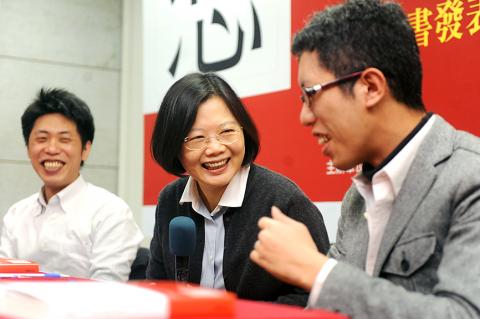Former Democratic Progressive Party (DPP) chairperson Tsai Ing-wen (蔡英文) was reserved yesterday about a proposed grand debate on the party’s China policy, saying that a debate could end up taking away flexibility in handling cross-strait affairs if it was not well-planned.
Speaking on the sidelines of a book launch held by her foundation, Tsai responded to a media inquiry about DPP Chairman Su Tseng-chang’s (蘇貞昌) proposal to hold such a debate, which was initiated after the party’s recently completed review of its China policy was criticized by many as “unimpressive” and “conservative.”
“The [DPP’s] cross-strait policy has always been a sensitive issue of diverse opinions. Part of it is suitable for a debate and part of it is not. A debate could eventually eliminate the DPP’s room for maneuver unless it is well-planned and well-crafted,” Tsai said.

Photo: Liao Chen-huei, Taipei Times
The former presidential candidate said the DPP’s China policy would have to find a balance between its core values and the political reality and “it takes time” to accomplish the feat.
The DPP would have to engage the public in communication as well as with Beijing during the process, she added.
After the DPP’s loss in the presidential election in 2012, several party members called for a debate, which would have been the second “grand debate” on the party’s China policy after the one held in 1998 when Hsu Hsin-liang (許信良) was chairman.
Several DPP lawmakers, including Gao Jyh-peng (高志鵬), Tuan Yi-kang (段宜康), Chao Tien-lin (趙天麟), Hsiao Bi-khim (蕭美琴), Lee Chun-yi (李俊俋) and Pasuya Yao (姚文智) supported the proposal.
Tsai spoke to reporters on the sidelines of a book-launch to introduce Thinking Taiwan — a collection of 82 articles published on thinkingtaiwan.com, an online forum.
The forum, established in August 2012 under Tsai’s Thinking Taiwan Foundation, aims to promote a “New Thought movement” among the public following her loss in the 2012 election, Tsai said, adding that it was not a politically motivated move.
Since its establishment, the Web site has published more than 1,600 articles by more than 500 authors and has on average about 200,000 page views per week, according to the foundation.
The articles, on a wide range of topics, have been thought-provoking as the discussion had gone beyond the conventional “election politics” and market economy beliefs, Tsai said.
She added that it has been a pleasant surprise that 80 percent of the Web site’s readership comes from the under-40 age group and almost half of the authors were born after 1980.
“That eased some people’s concern that young people today know how to gather and process information, but do not know how to think,” Tsai said.
Tsai said she was confident about the emerging civil society in Taiwan and said that political parties would have to reconsider their roles and make adjustments accordingly.

Taipei has once again made it to the top 100 in Oxford Economics’ Global Cities Index 2025 report, moving up five places from last year to 60. The annual index, which was published last month, evaluated 1,000 of the most populated metropolises based on five indices — economics, human capital, quality of life, environment and governance. New York maintained its top spot this year, placing first in the economics index thanks to the strength of its vibrant financial industry and economic stability. Taipei ranked 263rd in economics, 44th in human capital, 15th in quality of life, 284th for environment and 75th in governance,

Greenpeace yesterday said that it is to appeal a decision last month by the Taipei High Administrative Court to dismiss its 2021 lawsuit against the Ministry of Economic Affairs over “loose” regulations governing major corporate electricity consumers. The climate-related lawsuit — the first of its kind in Taiwan — sought to require the government to enforce higher green energy thresholds on major corporations to reduce emissions in light of climate change and an uptick in extreme weather. The suit, filed by Greenpeace East Asia, the Environmental Jurists Association and four individual plaintiffs, was dismissed on May 8 following four years of litigation. The

A former officer in China’s People’s Liberation Army (PLA) who witnessed the aftermath of the 1989 Tiananmen Square massacre has warned that Taiwan could face a similar fate if China attempts to unify the country by force. Li Xiaoming (李曉明), who was deployed to Beijing as a junior officer during the crackdown, said Taiwanese people should study the massacre carefully, because it offers a glimpse of what Beijing is willing to do to suppress dissent. “What happened in Tiananmen Square could happen in Taiwan too,” Li told CNA in a May 22 interview, ahead of the massacre’s 36th anniversary. “If Taiwanese students or

The New Taipei City Government would assist relatives of those killed or injured in last month’s car-ramming incident in Sansia District (三峽) to secure compensation, Mayor Hou You-yi (侯友宜) said yesterday, two days after the driver died in a hospital. “The city government will do its best to help the relatives of the car crash incident seek compensation,” Hou said. The mayor also said that the city’s Legal Affairs, Education and Social Welfare departments have established a joint mechanism to “provide coordinated assistance” to victims and their families. Three people were killed and 12 injured when a car plowed into schoolchildren and their